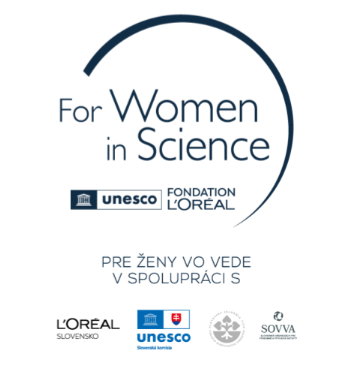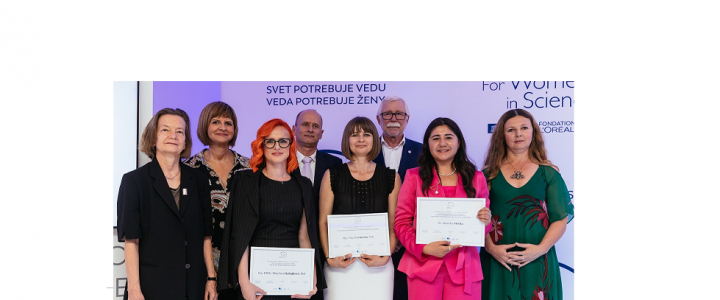
Bratislava, September 7, 2023: In today's times of climate crisis, uncertain economic forecasts, or the increase of civilizational diseases, scientific progress is more important than ever before. Three young scientists working in Slovakia, whose projects contribute to a brighter future and a more positive state of the world, were honored by the 7th year of the talent program L'Oréal - UNESCO For Women in Science in Slovakia. The female researchers divided the sum of 15,000 euros, which they can use not only for their scientific research. L'Oréal is cooperating with the Slovak Academy of Sciences (SAV), the Slovak Commission for UNESCO, and the Slovak Organization for Research and Development Activities (SOVVA) on this program. At the event, our director, Ľubomír Bilský, gave a speech and presented the prize to the laureates. We are pleased that we can support successful female scientists in this way and thus motivate even thorny women to set no limits to their dreams. Because the world needs science, and science needs women! Congratulations to the winners!
From left: prof. RNDr. Ľubica Lacinová, DrSc. – member of the SAS Presidium / Brigitte Streller, General Manager of L'Oréal in Slovakia / doc. RNDr. Miroslava Rabajdová, PhD – laureate in the category of science of living nature / Ing. Ľubomír Bilský, Executive Director SOVVA / Mgr. Olga Vyviurska, PhD., laureate in the category of physical and formal sciences / prof. RNDr. Pavol Šajgalík, DrSc. – President of SAS / Dr. Akansha Mehta, laureate in the engineering science and technology category / JUDr. Ľubica Erdelská, Secretary General of the Slovak Commission for UNESCO.
Scientific research has been the domain of men for many years, which is caused by several social and historical factors. It is more difficult for women to establish themselves in research environment, they encounter gender biases, and it is often not possible for them to effectively combine a career with family life. According to SOVVA data, in 2021, 48% of women participated in solving research projects in Slovakia, with the largest number of women in medical sciences (63%). These are part of a wide range of living nature sciences, including biology, chemistry and selected fields of agricultural sciences. The share of women in research teams of wildlife projects, which make up almost a quarter of all Slovak scientific activities, is 60.5%. Women are least represented in research projects in technical sciences – only 33%.
We care about the position of women
Supporting female researchers working in Slovakia and recognizing their important work is the goal of the L'Oréal - UNESCO For Women in Science program. Its 7th year has already recognized three laureates under the age of 40 (inclusive), who carry out their research at Slovak scientific workplaces. The award-winning scientists shared the sum of 15,000 euros, which they can use for professional and personal development. In total, almost 40 female scientists participated in the program this year.
"Although their representation is gradually increasing, compared to their male colleagues, the number of women working in scientific fields is still low. That is why we are very happy that many talented female researchers apply to our program every year, which encourages women to stay in a scientific environment and build a scientific career," said Petr Štěpánek, PhD., Scientific Director of L'Oréal in Slovakia.
The registered scientific projects were evaluated by an expert commission in the SAS, which was chaired by prof. RNDr. Ľubica Lacinová, DrSc., member of the SAS Presidium: "Science and constantly developing scientific knowledge are key for us as a society to be able to prevent future ecological, demographic, economic or other problems. We are proud that female scientists in Slovakia also carry out relevant research. Not only do they contribute to a more positive tomorrow, but they are also excellent role models for young girls interested in various scientific disciplines."The registered scientific projects were evaluated by an expert commission in the SAS, which was chaired by prof. RNDr. Ľubica Lacinová, DrSc., member of the SAS Presidium: "Science and constantly developing scientific knowledge are key for us as a society to be able to prevent future ecological, demographic, economic or other problems. We are proud that female scientists in Slovakia also carry out relevant research. Not only do they contribute to a more positive tomorrow, but they are also excellent role models for young girls interested in various scientific disciplines."
The seventh year of the L'Oréal - UNESCO For Women in Science program awarded prizes in a total of three research areas. In the category of engineering sciences and technologies, Dr. won. Akansha Mehta, who works at the Alexander Dubček University in Trenčín. In his ecological project, he transforms waste pharmaceutical glass into highly porous photocatalytic ceramic membranes, which are intended for the purification of waste water with the help of sunlight.
The winner of the physical and formal science category was Mgr. Olga Vyviurska, PhD. from the Institute of Analytical Chemistry, Faculty of Chemical and Food Technology, Slovak Technical University in Bratislava. In his work, he uses multi-factor mathematical models in order to reduce the number of individual measurements during the analysis of complicated chemical samples and thus simplify the entire sample processing process.
In the category of science about living nature, the commission determined doc. RNDr. Miroslava Rabajdová, PhD. working at the Faculty of Medicine of the P.J. Šafárik University in Košice. It deals with non-invasive diagnostics of changes in the in vitro fertilization process using RNA molecules. It determines high-quality embryos suitable for transfer to the uterus, embryos with the highest implantation potential, as well as the receptivity of the endometrium, i.e. the receptivity of the woman's uterus
Winners of the 7th year of the L'Oréal - UNESCO For Women in Science program
Natural Sciences:
1. Assoc. RNDr. Miroslava Rabajdová, PhD.
2. RNDr. Bronislava Víchová, PhD.
3. Petra Majerová, MSc., PhD.
Physical and formal sciences:
1. Mgr. Olga Vyviurska, PhD.
2. RNDr. Lenka Lorencová, PhD.
3. RNDr. Katarína Karľová, PhD.
Engineering Sciences and Technologies:
1. Akansha Mehta, PhD.
2. Prangya Parimita Sahoo, PhD.
3. Zulema Vargas Osorio, MSc., PhD.
Winning projects of the 7th edition of L'Oréal-UNESCO For Women in Science
Mgr. Olga Vyviurska, PhD. , Institute of Analytical Chemistry FCHPT STU, Bratislava
The consequence of the rapid development of the analytical instrument infrastructure and the increase in availability is the generation of a huge amount of data. Their evaluation by classical methods is very demanding in terms of time, material, and money and is contrary to the dominant trend of "green chemistry". These requirements can be met by reducing the number of experiments already during the development of the analytical method itself, for example, by using multi-factor mathematical models in the design of experiments for data collection and their processing. On the other hand, we also encounter situations where we cannot avoid generating a large amount of data, for example, when authenticating food products with a protected designation of origin. The specific taste and aroma of the product depends on several factors, such as the quality of the raw materials, production conditions and the geographical location from which the product originates. For this reason, in my project, I am concentrating on determining specific fragments typical for particular molecules, which will significantly reduce the amount of data to be processed.
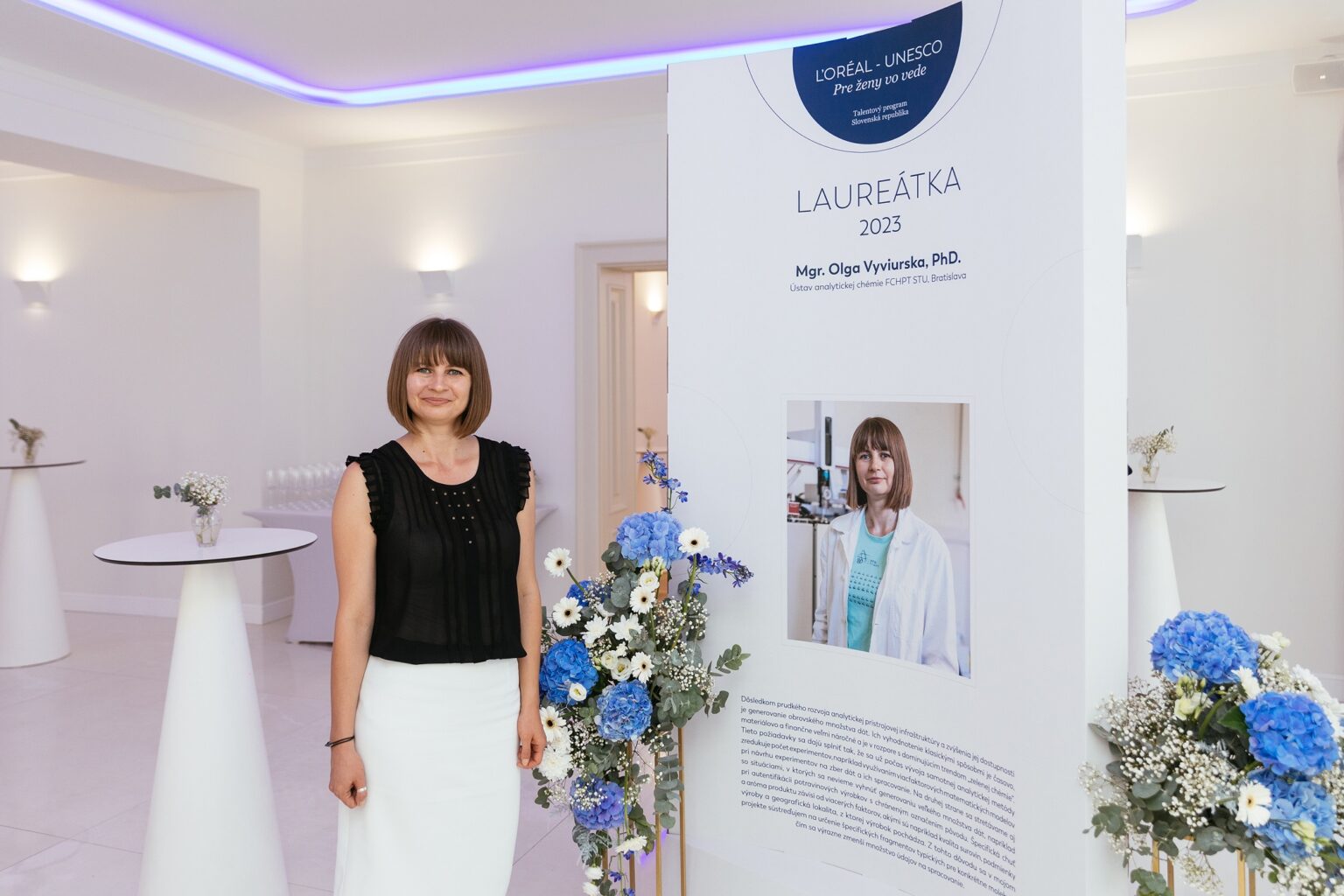
dr. Akansha Mehta, FunGlass – University of A. Dubček, Trenčín
Action research is needed to solve existing and emerging problems such as glass recycling and wastewater treatment. This project represents a more ecological and economic procedure for solving the problem. Covid-19 has dramatically increased the demand for pharmaceutical packaging, which will cause landfills to be "flooded" with waste glass in the coming years. However, the recycling of this glass is not fully implemented. Another environmental problem is wastewater treatment, the price of which is symbolic for now, but it may not be so in the future. In my project, therefore, I change waste pharmaceutical glass into highly porous photocatalytic ceramic membranes (PCMem), which are intended for the purification of wastewater with the help of solar radiation. In addition, 3D printing techniques will bring the possibility to modify membrane design and surface patterns depending on the organic components present in the wastewater, making such a solution very practical and variable.
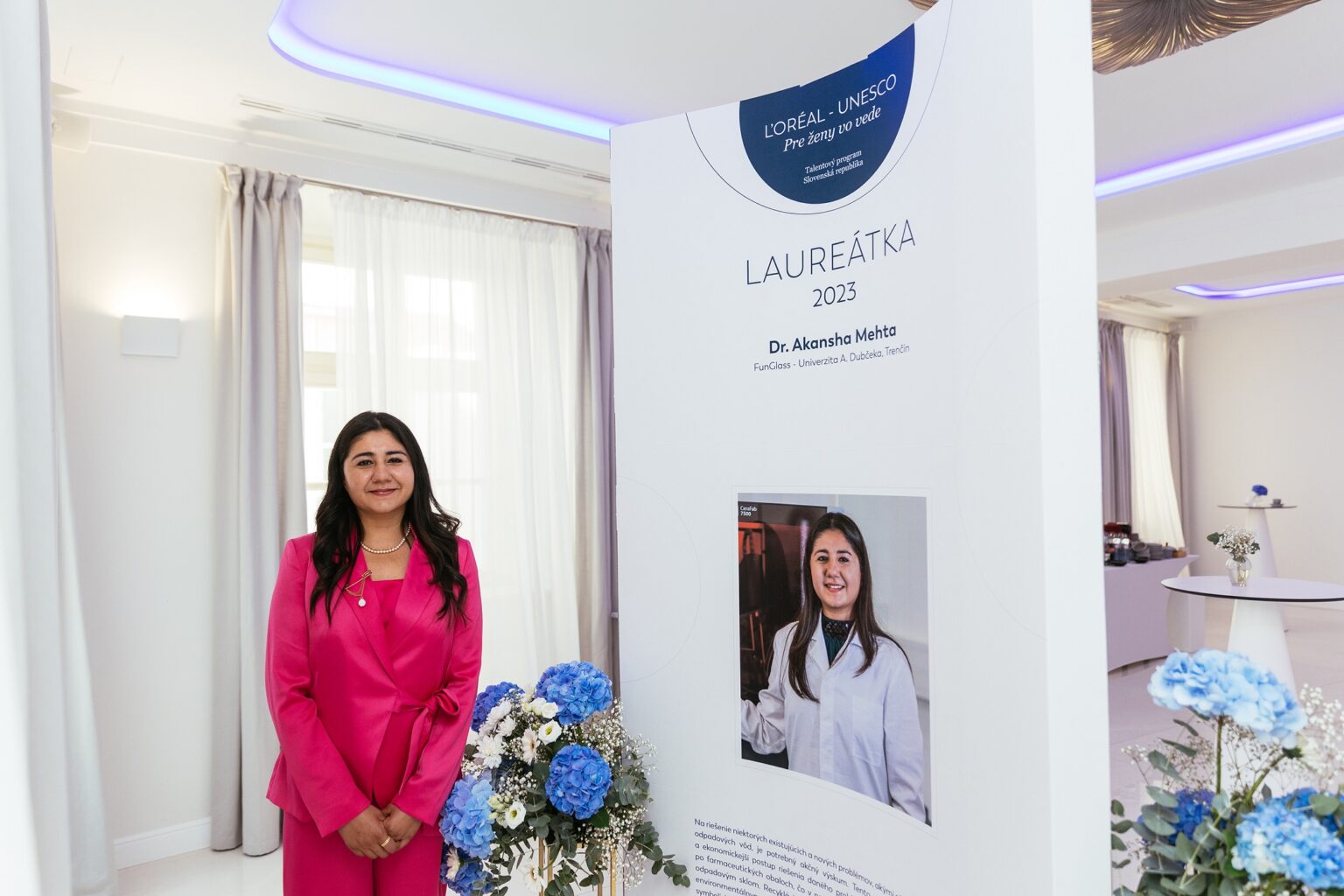
doc. RNDr. Miroslava Rabajdová, PhD., Faculty of Medicine – P.J. Šafárik University, Košice
Infertility currently affects a significant part of the population - up to 48 million couples. Artificial insemination is still one of the most effective methods of treating infertility. The interplay of many circumstances is key to a successful artificial insemination process, including the window of implantation, the receptivity of the endometrium of the woman's uterus, high-quality sperm and, last but not least, the selection of a high-quality embryo. Our scientific research activities at the Institute of Medical and Clinical Biochemistry UPJŠ LF in cooperation with clinical experts, are aimed at identifying molecules that have diagnostic potential, at determining not only the quality of the embryo, but also the embryo with the highest implantation potential, as well as researching molecules with the ability determine the receptivity, receptivity of the endometrium of a woman's uterus. The successful implementation of scientific research results in practice could in the future contribute to an increase in the success of IVF, a reduction in the number of repeated IVF transfers, a reduction in the financial costs of IVF treatment, and also to an overall improvement in the psychological health of couples undergoing the IVF process.
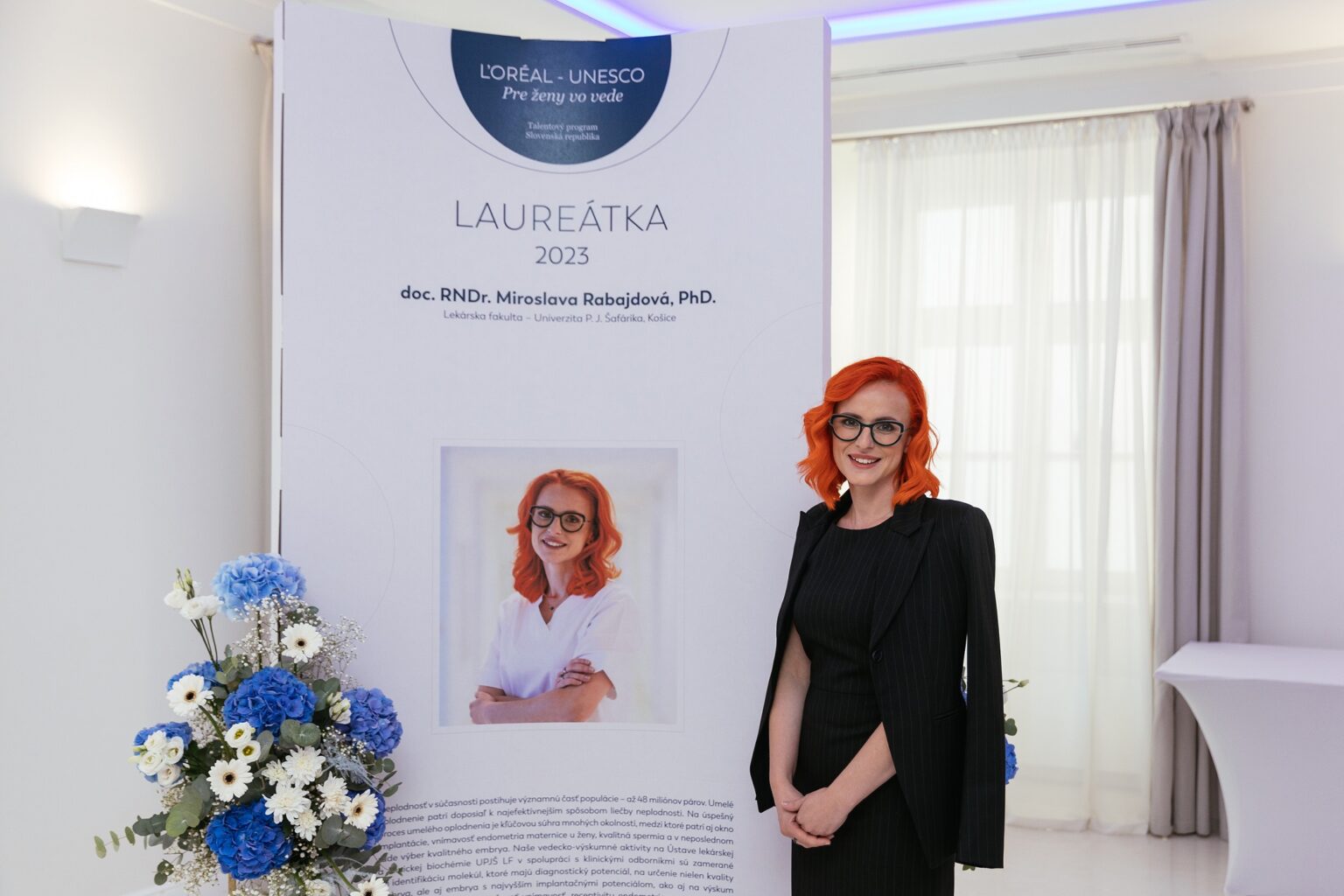
About the L'Oréal-UNESCO For Women In Science program
L'Oréal-UNESCO For Women in Science was founded in Paris in 1998 to support women scientists. The goal of the program is to appreciate the achievements of already established female scientists and their professional impact on contemporary society, as well as to provide support to young female scientists at the beginning of their careers. The program gradually expanded to many countries worldwide and honored more than 3,900 women from 110 countries.
Laureates of the 2016 L'Oréal - UNESCO Women in Science International Program, Professors Emmanuelle Charpentier and Jennifer A. Doudna, won the 2020 Nobel Prize in Chemistry. They thus followed the laureates of the 2008 international program, who in 2009 won the Nobel Prize in their field of expertise: Elisabeth Blackburn in the field of medicine and physiology, and Ada Yonath in the field of chemistry.
